12 助动词、系动词和情态动词专项复习课件 2024中考二轮复习(知识讲解+真题解析+能力拔高)
文档属性
| 名称 | 12 助动词、系动词和情态动词专项复习课件 2024中考二轮复习(知识讲解+真题解析+能力拔高) |  | |
| 格式 | pptx | ||
| 文件大小 | 30.9MB | ||
| 资源类型 | 试卷 | ||
| 版本资源 | 通用版 | ||
| 科目 | 英语 | ||
| 更新时间 | 2024-05-23 15:53:11 | ||
图片预览

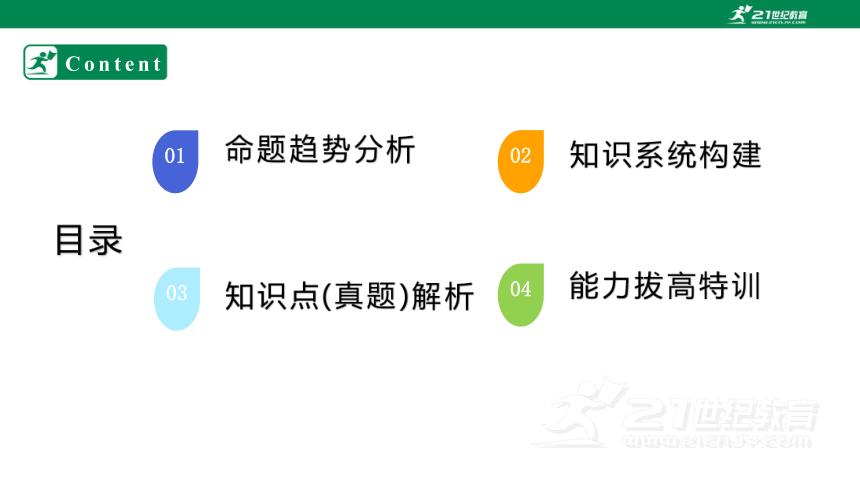

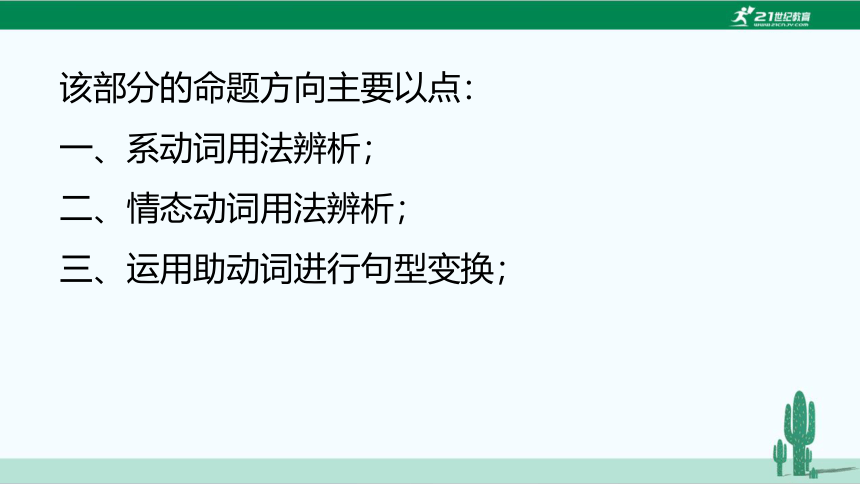
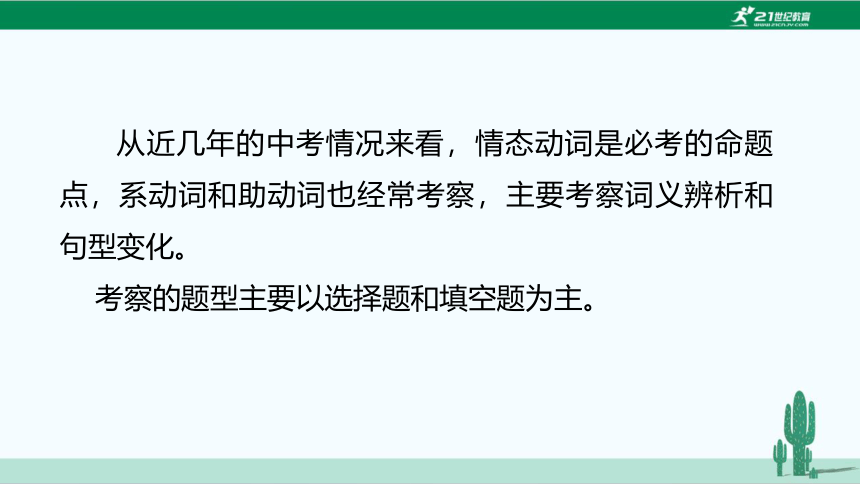

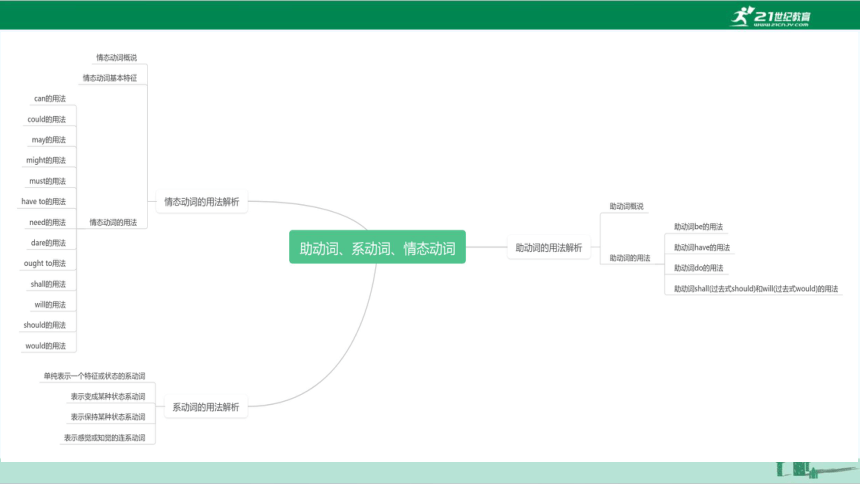

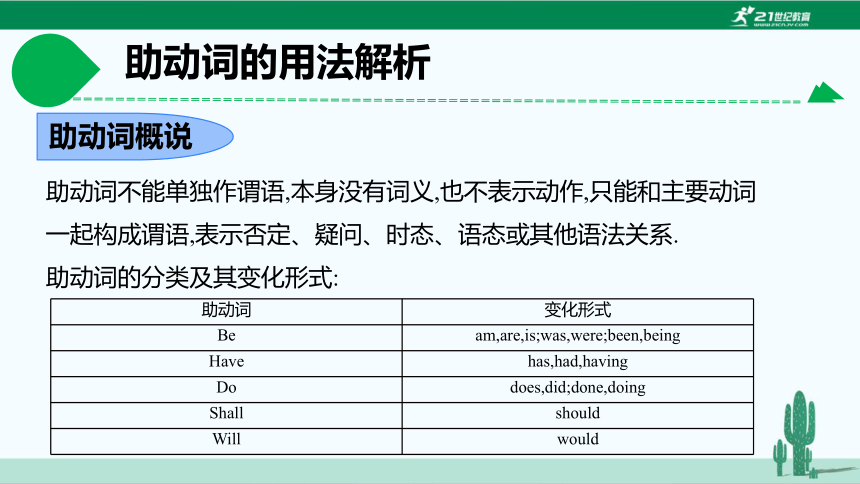
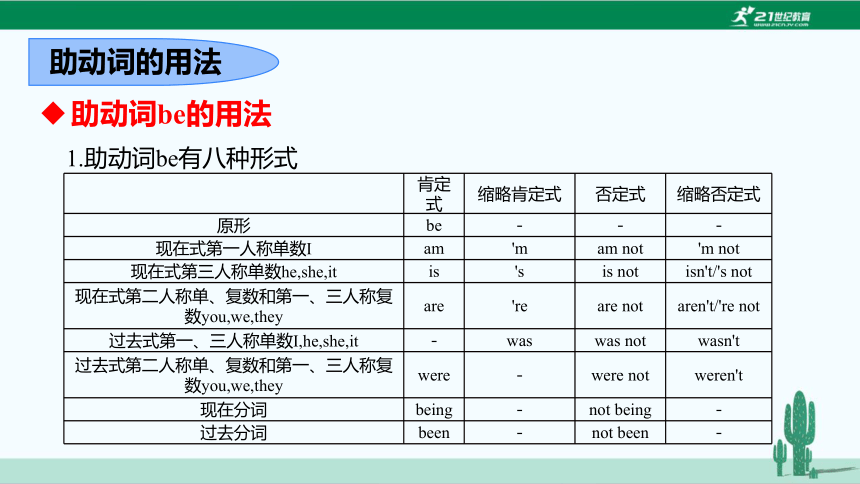
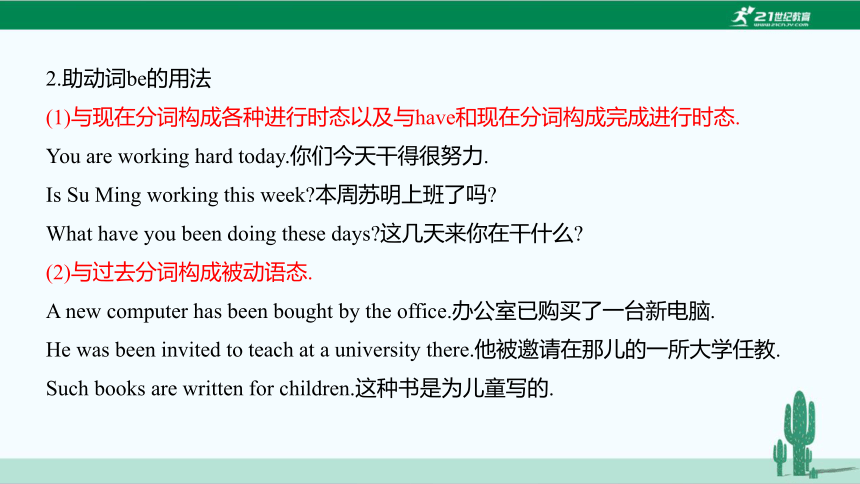
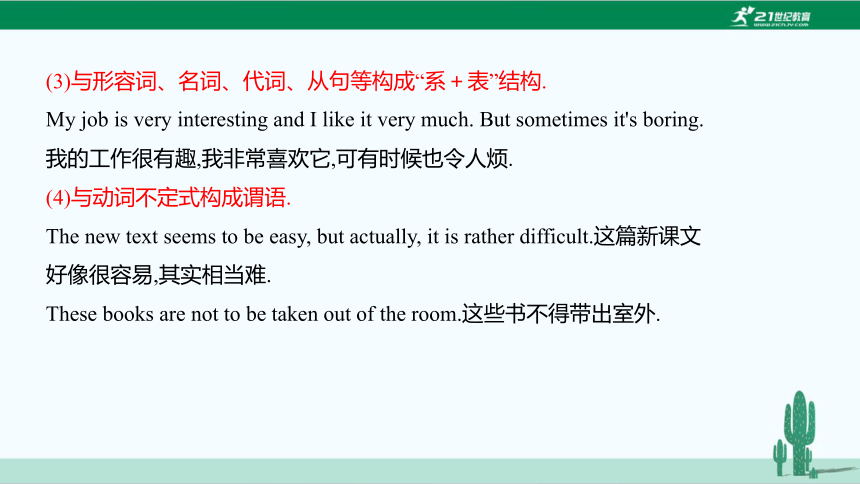
文档简介
(共73张PPT)
12 助动词、情态动词和系动词
专项复习
2024年中考二轮复习
Content
命题趋势分析
01
知识系统构建
02
知识点(真题)解析
03
能力拔高特训
04
目录
命题趋势分析
该部分的命题方向主要以点:
一、系动词用法辨析;
二、情态动词用法辨析;
三、运用助动词进行句型变换;
从近几年的中考情况来看,情态动词是必考的命题点,系动词和助动词也经常考察,主要考察词义辨析和句型变化。
考察的题型主要以选择题和填空题为主。
知识系统构建
知识点(真题)
解析
助动词不能单独作谓语,本身没有词义,也不表示动作,只能和主要动词一起构成谓语,表示否定、疑问、时态、语态或其他语法关系.
助动词的分类及其变化形式:
助动词概说
助动词的用法解析
助动词 变化形式
Be am,are,is;was,were;been,being
Have has,had,having
Do does,did;done,doing
Shall should
Will would
1.助动词be有八种形式
助动词的用法
助动词be的用法
肯定式 缩略肯定式 否定式 缩略否定式
原形 be - - -
现在式第一人称单数I am 'm am not 'm not
现在式第三人称单数he,she,it is 's is not isn't/'s not
现在式第二人称单、复数和第一、三人称复数you,we,they are 're are not aren't/'re not
过去式第一、三人称单数I,he,she,it - was was not wasn't
过去式第二人称单、复数和第一、三人称复数you,we,they were - were not weren't
现在分词 being - not being -
过去分词 been - not been -
2.助动词be的用法
(1)与现在分词构成各种进行时态以及与have和现在分词构成完成进行时态.
You are working hard today.你们今天干得很努力.
Is Su Ming working this week 本周苏明上班了吗
What have you been doing these days 这几天来你在干什么
(2)与过去分词构成被动语态.
A new computer has been bought by the office.办公室已购买了一台新电脑.
He was been invited to teach at a university there.他被邀请在那儿的一所大学任教.
Such books are written for children.这种书是为儿童写的.
(3)与形容词、名词、代词、从句等构成“系+表”结构.
My job is very interesting and I like it very much. But sometimes it's boring.
我的工作很有趣,我非常喜欢它,可有时候也令人烦.
(4)与动词不定式构成谓语.
The new text seems to be easy, but actually, it is rather difficult.这篇新课文好像很容易,其实相当难.
These books are not to be taken out of the room.这些书不得带出室外.
1.助动词have有五种形式
助动词have的用法
肯定式 缩略肯定式 否定式 缩略否定式
原形 have 've haven't/'ve not have not
现在式第三人称单数 has 's has not hasn't/'s not
过去式 had 'd had not hadn't/'d not
现在分词 having - not having -
过去分词 had - - -
2.助动词have的用法
(1)与过去分词构成各种完成时.
We've known each other since 1987.我们从1987年起就互相熟悉了.
He's been to Shanghai.他去过上海.
We have not seen each other since I left Beijing.自从我离开北京,我们就没见过面.
By the end of last month, we had studied English for two years.到上月底,我们已经学习了两年英语了.
(2)和动词不定式连用构成谓语,表示因客观环境促使不得不做的事.
The bus has left, and if we want to catch the train, we'll have to take a taxi.
公交车开走了,假如想赶上那趟火车,我们不得不打的.
1.助动词do有三种形式
助动词do的用法
肯定式 否定式 缩略否定式
原形 do do not don't
现在式第三人称单数 does does not doesn't
过去式 did did not didn't
2.助动词do的用法
(1)构成一般现在时和一般过去时的疑问句.
Do you know what they are talking about 你知道他们在谈论什么吗
What question did he ask you 他问你什么问题
(2)构成一般现在时和一般过去时的否定句.
He doesn't want to go there, neither do they. 他不想去那儿,他们也不想.
He didn't come to school last Monday.上星期一他没来上学.
(3)代替前面刚出现的动词,以避免重复.
-Do you learn English 你学习英语吗
-Yes, I do.是的,我学习英语.
This material looks nice. So does that one.这料子看来很好.那种也很好.
(4)用于加强语气,表示强调(多用于肯定式中).
Do come and join us.一定要来参加我们的活动.
I do think you are right.我的确认为你是对的.
I do like you.我真的喜欢你.
【知识拓展】
do还可用作实义动词,表示“做、干”等含义.
(1)They went out to do some shopping.他们外出买东西去了.
(2)Would you please do me a favour 你愿帮我一个忙吗
助动词shall(过去式should)和will(过去式would)有下列几种形式
助动词shall(过去式should)和will(过去式would)的用法
肯定式 缩略肯定式 否定式 缩略否定式
Shall '11 shall not shan't
Should 'd should not shouldn't
Will '11 will not won't/'ll not
would 'd would not Wouldn’t/’d not
2.助动词shall(过去式should)和will(过去式would)的用法
(1)“shall/will+动词原形”,构成一般将来时,表示将来意义.shall用于单复数第一人称,will可用于所有人称.在今日英语中,shall常被will替代.
Will you close the door, please 请关上门好吗
Shall I open the door It's stuffy in the room.我打开门好吗 房间里很闷.
When will Mike arrive here tomorrow 迈克明天什么时候到达这里
He will arrive here at three o'clock tomorrow.他明天三点钟到达这里.
(2)“should/would+动词原形”,构成过去将来时.should作为“shall”的过去形式,用于单复数第一人称;would作为“will”的过去式,可用于各人称.
They said that they would finish it soon.他们说很快就要做完了.
Did you ask Kate when they would return 你问没问凯特他们什么时候返回来
【知识拓展】
will可表示某种倾向或习惯性动作
The door won't shut.门关不上.
Fish will die out of water.鱼离开水不能活.
情态动词表示说话人的语气和观点;
情态动词只有情态意义,即它表示说话人对动作的观点,如需要、可能、意愿或怀疑等。
情态动词主要有:can(could),may(might),must, ought to, need, dare(dared), have to(had to).此外shall, will, should, would在一定场合下也可用作情态动词.
情态动词的用法解析
情态动词概说
1.在形式上,情态动词大多没有实义动词的各种变化,只有could, would, had to, might, should等几个过去式,其他如must, ought to等的过去式皆与现在式同形,且在各种人称后都用同样的形式。
2.在意义上,大多数情态动词有多个意义.如can可表示“能够”“可能”“允许”等,may可表示“可能”“允许”“目的”“让步”等
3.在用法上,情态动词(除ought跟不定式外)与助动词一样,须后接动词原形,而构成谓语动词
情态动词基本特征
can的用法
(1)表示能力“会、能”等.
The hall can hold at least 2000 people.这个大厅至少能容纳2000人.
Can you drive a car 你会开车吗
(2)表示“建议”或“请求”,可用can I...或can you...等结构,语气比较客气.
Can I go swimming today, please, Mum 妈妈,我今天可以去游泳吗
Can I borrow your bike 我可以借你的自行车用一下吗
情态动词的用法
(3)表示惊异、怀疑、不相信等态度(主要用于否定句和疑问句).
No, no, this can't be true.不,不,这不可能是真的.
How can you be so careless 你怎么能这样粗心呢
(4)表示“允许”或“请求允许”,其意思相当于may(可以),但can比may用得更广泛,can不仅表示说话人同意、允许,还可表示客观条件的许可.may通常表示说话人的许可.
No one can smoke in the office.在办公室里任何人都不能吸烟.
That sort of thing can't go on like this.那样的事不能再这样继续下去.
【知识拓展】can和be able to
(1)两者都可表示“能力”,意思上相同,但can只有现在式和过去式(could)两种形式,如需用其他时态,用be able to代替.
He can still be alive.他可能还活着.
He can't be poor.他不可能贫穷.
He has not been able to finish the work in time.他没能及时完成工作.
I'll be able to see you tomorrow,我明天将能去看你.
(2)如果我们要表示一个动作成功地完成了,那么必须使用was able to,而不能用could.
He was able to leave Europe before the war began.他设法在战前离开了欧洲.
He was able to go to Paris yesterday and he enjoyed himself very much.
他昨天设法去了巴黎,而且他玩得非常高兴.
(3)在否定句中could与be able to两者意思一样.
I could nor swim to the other side of the river.
I wasn't able to swim to the other side of the river.我没能游到河的对岸去.
(1)could是can的过去式,表示过去有能力及过去存在的可能性.
He couldn't go that day.那天他不可能去.(可能性)
I could drive a car before I left school.毕业前我就会开车了.(能力)
(2)用于现在时和将来时,代替can;表示更为客气、婉转地提出请求或陈述看法,有时则表示可能性不大.
Could you tell me where I can change some money 你能告诉我在哪儿能换钱吗
Could you sign here please, Sir 先生,请在这儿签字好吗
could的用法
(1)表示客气或委婉的请求
-May I come in 我可以进来吗
-Yes, please.可以,请进.
-May I borrow your bicycle 我可以借用一下你的自行车吗
-Certainly.当然可以.
(2)表示“可以”即表示说话人同意、许可,或在疑问句中,征询对方的许可.其否定式可用may not.但在表示“不可以”“不许”“禁止”“阻止”等意思时,常用must not(mustn't)代替may not.
-May I take this book out of the reading-room 这本书我可以带出阅览室吗
-No, you mustn't.不可以.
may的用法
(3)表示可能.用来表示一件事或许会发生,或是某种情况可能会存在.通常只用于肯定或否定陈述句中,而不用于疑问句中.
It may rain today.今天可能下雨.
You may have another cake.你可以再吃一块蛋糕.
She may not go to the concert tonight.今晚她可能不去听音乐会了.
(4)表示祝愿.
May you succeed!祝你成功!
May all your dreams come true!愿你的理想都成为现实!
(1)作为may的过去式,用来表示过去的“可能”和“允许”,多用于间接引语.
He said that the news might be true.他说这消息可能是真的.
She asked if she might have my bike.她问是否可以借用我的自行车.
(2)代替may,表示可以做的事或可能发生的事.也可用于有礼貌地提出建议或请求,意为“可以”,在这种情况下,may和might无时间上的差别,只是更客气或更婉转些.
They might have a lot of work to do.他们可能有很多事要做.
Might I have a word with you 我可以同你说句话吗
might的用法
(1)表示“必须,应当”.
用第一人称时,表示说话人认为有义务、有必要做某事;
用第二、三人称时,表示说话人命令或要求别人做某事;
在疑问句中,表示询问对方的意图.
We must love our country.我们要爱国.
I must take a day off tomorrow.我明天必须请假一天.
Soldiers must obey orders.士兵必须服从命令.
must的用法
(2)must的否定式(mustn't)表示“不应该”“不许可”“不准”“禁止”等,语气比较强烈.
You mustn't speak loudly in the library.不许在图书馆大声喧哗.
We mustn't waste our time.我们不应该浪费我们的时间.
(3)表示肯定的揣测(只用于肯定句):一定、准是、必定.
The lady must be a doctor.那个女人一定是个医生.
He hasn't come yet. He must be ill.他还没来,准是病了.
Miss Gao must be in the office.高老师一定在办公室里.
This must be Wang Hai's book.这一定是王海的书.
【知识拓展】
对must问句的否定回答,需要用;need not(needn't)不需要,或don't have to不必.
-Must I do my homework now 我现在必须做作业吗
-Yes, you must.是的,你非做不可.
-No, you needn't(need not)./don't have to.不,你不必现在做.
(1)表示“不得不”“必须”的意思,与must在这个意思上很接近.must强调说话者的主观看法,意为“必须”;have to强调客观的需要,意为“不得不”.
I missed the train, so I had to take a taxi.我误了火车,所以我得乘出租车.
must仅用于表示现在和将来的义务,讲述过去,要用had to.
I had to leave early because I wasn't feeling well.我不得不早点儿离开,因为我觉得不舒服.
在口语中,可用have got to代替 have to.
Sorry I have got to go (=have to go) now.抱歉,我现在非走不可了.
have to的用法
(1)need表示“需要”“必须”.作为情态动词主要用于否定句和疑问句,无时态、人称变化,后面跟动词原形.其否定式为:need not(needn't).
You needn't try to explain.你不需要解释.
She needn't come tomorrow.她明天不必来.
【知识拓展】
needn't后面跟“have+过去分词”结构,表示“过去已做了(但)没有必要做的事情”.
The question needn't have been discussed.此问题本来不需讨论的.
need的用法
(2)need用作及物动词,主要用于肯定句,有人称、时态和数的变化,后接带to的不定式.其否定形式要借助于don't, doesn't或didn't;疑问形式要借助于do, does或did.
He needs to know it.他需要知道这件事.
Do you need any help 你需要帮助吗
I don't need things like that.我不需要那样的东西.
dare作为情态动词,主要用于否定句和疑问句,表示“敢于”,本身无变化(各人称都用dare),后面跟不带to的不定式,过去时用dared,其否定式为:dare not/daren't, dared not.
Dare he say so 他敢这样说吗
She knows he was wrong but she daren't tell him.她知道他错了,却不敢告诉他.
dare用作及物动词的时候更多一些.这时dare后可以跟动词不定式,用于各种结构中.
Do I dare to ask her 我敢问她吗
He didn't dare to go.他不敢去.
dare的用法
表示“应该”做某事,常可与should互换.
You ought to be punctual.你应该守时.
Students ought not to be late for class.学生上课不应该迟到.
Ought we to answer this question now 我们应当现在就回答这个问题吗
ought to后面跟“have+过去分词”结构,表示对过去该做而未做之事的责难、后悔或遗憾的心情.
You ought to have helped her.你本该帮助她的.(却没有帮助她)
He ought to have returned these books to the library last week.
他上星期就应该把这些书还给图书馆.(却没有还书)
ought to用法
(1)shall作为情态动词,用于陈述句的第二、三人称,表示说话人的强烈意愿和决心,有“允诺”“警告”“命令”等含义,意思是“必须”.
You shall come whenever you are wanted.什么时候叫你就要什么时候到.(强制)
You shall not leave your post.你不得离开岗位.(警告)
He shall get the answer tomorrow.他明天可以得到答复.(允诺)
(2)shall作为情态动词,在疑问句中可用于第一、三人称,表示征询对方意见或请求,意思是“要不要”“好不好”.
Shall he come to see you 要不要他来看你
Shall we go for walk 我们去散散步好吗
Shall I turn on the light 我要开灯吗
shall的用法
(1)表示“意志”“意愿”,可用于多种人称.
He'll help you if you ask him.如果你请他帮忙,他是愿意帮忙的.
Will you give him a message when you see him 见到他时,请你通知他一下好吗
(2)will还可用来表示一种习惯性动作或状态,有“总是”“惯于”等意思.
Fish will die out of water.鱼儿离开水会死去.
He will talk for hours if you give him the chance.如果你给他机会,他会滔滔不绝地谈上几个钟头.
will的用法
(1)表示“义务或责任”,意思是“应该”.
I should speak and write English every day.我应该天天说、写英语.
We should learn from each other and help each other.我们应该互相学习,互相帮助.
(2)表示推测、预期.
They should be here by now.他们现在该到了.
Tom should know her address.估计汤姆知道她的住址.
(3)should后面跟“have+过去分词”结构,其肯定句,表示过去应该做而未做的事,其否定句则表示过去不该做但做了的事情.
He looks very tired. He should have had a good rest at home.他看上去很累了,本应该待在家里好好休息.
should的用法
(1)would作为情态动词will的过去式,表示过去时间的“意志”“愿望”或“决心”等,可用于各人称.
I said I would do anything for him.我说过,我愿意为他做任何事.
He said he would get up earlier the next morning.他说第二天早上要早点起床.
(2)would可用来表示人的意愿、个人想法.在疑问句中用于第二人称,表示有礼貌、较婉转的请求.如:
Would you like to have a glass of tea 你要喝一杯茶吗
Would you mind closing the door 请关上门好吗
would的用法
它本身有一定词义,但不能单独作谓语,必须与表语一起构成系表结构.连系动词可以分为以下类:
1.单纯表示一个特征或状态:
be(是、在),seem(似乎是),appear(显得、看来好像).
She is a very good student.她是个非常好的学生.
He seems to be sick.他似乎是生病了.
系动词的用法解析
2.表示变成某种状态
这样的动词有become(变成),come(成为),fall(变得),get(变得),grow(渐渐变得),run(变成),turn(变为),go(变成),prove(证明),make(变为).
His grandma is growing very old.他的祖母年纪很大了.
It's getting darker and darker.天越来越黑了.
He became a doctor three years ago.他3年前当上了医生.
His face turned pale. He must be ill.他的脸变得苍白,他一定是病了.
He fell asleep.他睡着了.
The meat has gone bad.肉变坏了.
3.表示保持某种状态
这样的动词有continue(仍旧是),keep(保持),lie(处于······状态),remain(仍是),,stand(处于···状态),stay(继续处于······状态)等.Keep quiet, please.请安静.
You must look after yourself and keep healthy.你要照顾好自己,保持身体健康.
The weather continued fine for several days.一连好几天天气都很好.
Shops remained open till late in the evening.商店开到晚上很晚的时候.
The window stayed open all the night.窗子整夜开着.
The house stood empty for a long time.那所房子空了好长一段时间.
4.表示感觉或知觉的连系动词
常用来表示人的感觉或知觉的连系动词有feel, taste, smell, sound和look,分别相当于汉语中的“摸起来,感觉”“尝起来”“闻起来”“听起来”“看上去”的概念.后面通常接形容词作表语,也可接介词短语like.
The music sounds beautiful.这段音乐听起来很优美.
The rock looked like a tiger.这块岩石看上去像只老虎.
1.(2023·河北·统考中考真题)If we ________ find a better way, we’ll finish the job faster.
A.can B.can’t C.must D.mustn’t
【答案】A
【详解】句意:如果我们能找到更好的方法,我们就能更快地完成这项工作。
考查情态动词。can能;can’t不能;must必须;mustn’t禁止。根据“ ...find a better way, we’ll finish the job faster”可知,此处指要是能找到更好的方法,就能更快地完成工作,故选A。
真题再现
2.(2023·湖北武汉·统考中考真题)—Excuse me, but we ________ wait in line to get on the subway.
—I’m sorry.
A.might B.would C.could D.should
【答案】D
【详解】句意:——对不起,我们应该排队上地铁。——我很抱歉。
考查情态动词辨析。might可以;would将;could可以;should应该。根据“but we …wait in line to get on the subway”可知,应该排队上地铁,故选D。
3.(2023·山东滨州·统考中考真题)—The paper cutting is pretty lively. Who made it
—It ________ be Mary. None of us except her is able to do it.
A.can B.must C.need D.might
【答案】B
【详解】句意:——剪纸很生动。是谁做的?——一定是Mary。除了她,我们谁也做不到。
考查情态动词。can能;must一定;need需要;might可能。根据“None of us except her is able to do it”可知除了Mary,没有人能做,所以一定是Mary做的。故选B。
4.(2023·甘肃白银·统考中考真题)—I ________ find my keys.
—Have you checked in your jacket pockets
A.mustn’t B.shouldn’t C.can’t D.wouldn’t
【答案】C
【详解】句意:——我找不到我的钥匙了。——你检查过你的夹克口袋了吗?
考查情态动词。mustn’t禁止;shouldn’t不应该;can’t不能;wouldn’t将不。根据“Have you checked in your jacket pockets ”可知是自己不能找到钥匙,应用can’t。故选C。
5.(2023·湖南怀化·统考中考真题)—______ I join the volunteer program on weekends
—Of course you can.
A.Can B.Must C.Should
【答案】A
【详解】句意:——我可以在周末参加志愿者项目吗?——你当然可以。
考查动词辨析。Can可以;Must必须;Should应该。根据答句“Of course you can.”可知此处应是询问是否可以参加志愿者项目,应用情态动词can表示请求许可。故选A。
6.(2023·天津·统考中考真题)—Would you like to visit Tianjin University tomorrow
—Sorry, I’m afraid I ________. I’ll work as a volunteer in my community.
A.can B.can’t C.must D.mustn’t
【答案】B
【详解】句意:——你明天想参观天津大学吗?——对不起,我恐怕不能。我要在我的社区做志愿者。
考查情态动词。can能够;can’t不能;must必须;mustn’t禁止。根据“I’ll work as a volunteer in my community.”可知不能去参观天津大学。故选B。
7.(2023·云南·统考中考真题)—Excuse me, may I use my phone now
—Sorry, you ________. The plane is taking off.
A.need B.needn’t C.can D.can’t
【答案】D
【详解】句意:——对不起,我现在可以用电话吗?——对不起,你不能。飞机马上要起飞了。
考查情态动词。need需要;needn’t没必要;can可以;can’t不能。根据“The plane is taking off.”可知此处是作否定回答。can’t“不能”符合语境。故选D。
8.(2023·四川成都·统考中考真题)Your answer ________ be right, but I’m going to check to make sure.
A.can’t B.might C.must
【答案】B
【详解】句意:你的答案可能是对的,但我要检查一下以确保正确。
考查动词辨析。can’t不能;might也许;must必须。根据“Your answer...be right, but I’m going to check to make sure.”可知,答案可能是对的,但还要检查一下。故选B。
9.(2023·四川自贡·统考中考真题)— Would you like to eat some fried chicken
— No, thanks. I think it ________ delicious but is unhealthy.
A.sounds B.feels C.tastes
【答案】C
【详解】句意:——你想吃点炸鸡吗?——不,谢谢。我认为它尝起来很好吃,但不健康。
考查动词辨析。sounds听起来;feels感觉;tastes尝起来。根据“I think it...delicious but is unhealthy.”可知,炸鸡尝起来很好吃,但不健康。故选C。
能力拔高特训
一、单项选择
1.The soup ________ a little salty, there is no need to add more salt.
A.looks B.smells C.sounds D.tastes
【答案】D
2.—It ________ really great. I’d like another cup.
A.looks B.feels C.tastes
【答案】C
3.—Selina, I want to learn something about the Winter Olympic Games in Beijing.
—Frank ________ know it, because he cares best about it.
A.has to B.must C.can’t D.might
【答案】B
4.When our parents become too old to take care of themselves one day, they __________ be looked after well by us.
A.should B.shouldn’t C.may D.may not
【答案】A
5.—Dad, what’s for dinner It ________ nice!
—I’m cooking chicken soup.
A.tastes B.smells C.looks D.feels
【答案】B
6.—Paul, have you tried this chicken It’s a special in Luzhou and has been introduced in the TV program A Bite of China.
—Yes, it ________ hot but delicious.
A.eats B.looks C.tastes D.sees
【答案】C
7.—The paper cutting is pretty lively, who made it
—It ________ be Amy. None of us except her is able to do it.
A.would B.need C.must D.can
【答案】C
8.—Look! Mark is reading a book in the library.
—It ________ be him. He is in the classroom.
A.can’t B.wouldn’t C.needn’t
【答案】A
9.The clever boy ________ recite so many poems when he was three.
A.might B.would C.could
【答案】C
10.The boy ________ be Tom. I saw him reading in the library just now.
A.shouldn’t B.can’t C.needn’t
【答案】B
11.—Primary school students will have the cooking course.
—That _________ great. Cooking is a necessary life skill.
A.looks B.tastes C.smells D.sounds
【答案】D
12.— Hmm, something ________ so good. What is it
— Hand-made e and try some.
A.tastes B.sounds C.smells
【答案】C
13.We should learn some basic life skills since we ________ depend on ourselves some day.
A.can B.can’t C.must D.mustn’t
【答案】C
14.—Whose is this toy truck
—It _________ belong to Dick. He was the only little kid at the picnic.
A.can’t B.must C.could D.need
【答案】B
15.—Neither the students nor the teacher ________ in the classroom. Where are they
—They have gone to the playground.
A.is B.are C.was D.were
【答案】A
16.—I don’t think you can take photos here. Look at that sign!
—Sorry, I _________ it just now.
A.notice B.will notice C.haven’t noticed D.didn’t notice
【答案】D
17.Tom is going there. You ________ go there.
A.needn’t to B.don’t need to C.don’t need D.need
【答案】B
18.Hello! I’m very glad to see you again. When ________ you ________ here
A.did; arrive B.will; arrive
C.have; arrived D.are; arriving
【答案】A
19.—Alex, come down to play football.
—I can’t. Mom said I ________ clean my bedroom before doing anything else.
A.had to B.will C.used to D.can
【答案】A
20.—Who is playing the piano in the music room Is it Mary
—No, it ________ be her. She has ________ to Beijing on business.
A.couldn’t; been B.can’t; gone
C.can’t; been D.mustn’t; gone
【答案】B
21.—David, do you know Su Yiming, a snowboarder from China
—Sure. He won the first place in the men’s Big Air Event. He ________ be hard-working.
A.needn’t B.can’t C.should D.must
【答案】D
22.—There is a new art museum in our city. You _______ miss it.
—Thank you. I won’t.
A.can’t B.must C.needn’t
【答案】A
23.—Whose physics book is this
—It ________ be Helen’s because her name is on it.
A.mustn’t B.must C.might D.can’t
【答案】B
24.—I can’t stop playing computer games.
—For your health, my boy. I’m afraid you ______.
A.can B.may C.will D.have to
【答案】D
25.—Who is the boy under the tree
—He _________ be Tom’s brother, I’m not sure.
A.may B.can’t C.must D.shouldn’t
【答案】A
26.Mr. Wu tells me that we ________ come to the library every time. We ________ renew books online.
A.can’t; can B.mustn’t; must
C.needn’t; can D.shouldn’t; may
【答案】C
二、用括号内所给单词的适当形式填空
1.Sally cut out her pictures on DingTalk by mistake just now. (改为否定句)
Sally ________ ________ out her pictures on DingTalk by mistake just now.
【答案】 didn’t cut
2.Michael shut the door after hearing the news.(改为否定句)
Michael ________ ________ the door after hearing the news.
【答案】 didn’t shut
3.I brush my teeth twice a day. (改为否定句)
I ________ my teeth twice a day.
【答案】don’t brush
4.I was doing my homework at seven last night.(变成否定句)
I ________ ________ my homework at seven last night.
【答案】 wasn’t doing
谢谢
21世纪教育网(www.21cnjy.com)
中小学教育资源网站
兼职招聘:
https://www.21cnjy.com/recruitment/home/admin
12 助动词、情态动词和系动词
专项复习
2024年中考二轮复习
Content
命题趋势分析
01
知识系统构建
02
知识点(真题)解析
03
能力拔高特训
04
目录
命题趋势分析
该部分的命题方向主要以点:
一、系动词用法辨析;
二、情态动词用法辨析;
三、运用助动词进行句型变换;
从近几年的中考情况来看,情态动词是必考的命题点,系动词和助动词也经常考察,主要考察词义辨析和句型变化。
考察的题型主要以选择题和填空题为主。
知识系统构建
知识点(真题)
解析
助动词不能单独作谓语,本身没有词义,也不表示动作,只能和主要动词一起构成谓语,表示否定、疑问、时态、语态或其他语法关系.
助动词的分类及其变化形式:
助动词概说
助动词的用法解析
助动词 变化形式
Be am,are,is;was,were;been,being
Have has,had,having
Do does,did;done,doing
Shall should
Will would
1.助动词be有八种形式
助动词的用法
助动词be的用法
肯定式 缩略肯定式 否定式 缩略否定式
原形 be - - -
现在式第一人称单数I am 'm am not 'm not
现在式第三人称单数he,she,it is 's is not isn't/'s not
现在式第二人称单、复数和第一、三人称复数you,we,they are 're are not aren't/'re not
过去式第一、三人称单数I,he,she,it - was was not wasn't
过去式第二人称单、复数和第一、三人称复数you,we,they were - were not weren't
现在分词 being - not being -
过去分词 been - not been -
2.助动词be的用法
(1)与现在分词构成各种进行时态以及与have和现在分词构成完成进行时态.
You are working hard today.你们今天干得很努力.
Is Su Ming working this week 本周苏明上班了吗
What have you been doing these days 这几天来你在干什么
(2)与过去分词构成被动语态.
A new computer has been bought by the office.办公室已购买了一台新电脑.
He was been invited to teach at a university there.他被邀请在那儿的一所大学任教.
Such books are written for children.这种书是为儿童写的.
(3)与形容词、名词、代词、从句等构成“系+表”结构.
My job is very interesting and I like it very much. But sometimes it's boring.
我的工作很有趣,我非常喜欢它,可有时候也令人烦.
(4)与动词不定式构成谓语.
The new text seems to be easy, but actually, it is rather difficult.这篇新课文好像很容易,其实相当难.
These books are not to be taken out of the room.这些书不得带出室外.
1.助动词have有五种形式
助动词have的用法
肯定式 缩略肯定式 否定式 缩略否定式
原形 have 've haven't/'ve not have not
现在式第三人称单数 has 's has not hasn't/'s not
过去式 had 'd had not hadn't/'d not
现在分词 having - not having -
过去分词 had - - -
2.助动词have的用法
(1)与过去分词构成各种完成时.
We've known each other since 1987.我们从1987年起就互相熟悉了.
He's been to Shanghai.他去过上海.
We have not seen each other since I left Beijing.自从我离开北京,我们就没见过面.
By the end of last month, we had studied English for two years.到上月底,我们已经学习了两年英语了.
(2)和动词不定式连用构成谓语,表示因客观环境促使不得不做的事.
The bus has left, and if we want to catch the train, we'll have to take a taxi.
公交车开走了,假如想赶上那趟火车,我们不得不打的.
1.助动词do有三种形式
助动词do的用法
肯定式 否定式 缩略否定式
原形 do do not don't
现在式第三人称单数 does does not doesn't
过去式 did did not didn't
2.助动词do的用法
(1)构成一般现在时和一般过去时的疑问句.
Do you know what they are talking about 你知道他们在谈论什么吗
What question did he ask you 他问你什么问题
(2)构成一般现在时和一般过去时的否定句.
He doesn't want to go there, neither do they. 他不想去那儿,他们也不想.
He didn't come to school last Monday.上星期一他没来上学.
(3)代替前面刚出现的动词,以避免重复.
-Do you learn English 你学习英语吗
-Yes, I do.是的,我学习英语.
This material looks nice. So does that one.这料子看来很好.那种也很好.
(4)用于加强语气,表示强调(多用于肯定式中).
Do come and join us.一定要来参加我们的活动.
I do think you are right.我的确认为你是对的.
I do like you.我真的喜欢你.
【知识拓展】
do还可用作实义动词,表示“做、干”等含义.
(1)They went out to do some shopping.他们外出买东西去了.
(2)Would you please do me a favour 你愿帮我一个忙吗
助动词shall(过去式should)和will(过去式would)有下列几种形式
助动词shall(过去式should)和will(过去式would)的用法
肯定式 缩略肯定式 否定式 缩略否定式
Shall '11 shall not shan't
Should 'd should not shouldn't
Will '11 will not won't/'ll not
would 'd would not Wouldn’t/’d not
2.助动词shall(过去式should)和will(过去式would)的用法
(1)“shall/will+动词原形”,构成一般将来时,表示将来意义.shall用于单复数第一人称,will可用于所有人称.在今日英语中,shall常被will替代.
Will you close the door, please 请关上门好吗
Shall I open the door It's stuffy in the room.我打开门好吗 房间里很闷.
When will Mike arrive here tomorrow 迈克明天什么时候到达这里
He will arrive here at three o'clock tomorrow.他明天三点钟到达这里.
(2)“should/would+动词原形”,构成过去将来时.should作为“shall”的过去形式,用于单复数第一人称;would作为“will”的过去式,可用于各人称.
They said that they would finish it soon.他们说很快就要做完了.
Did you ask Kate when they would return 你问没问凯特他们什么时候返回来
【知识拓展】
will可表示某种倾向或习惯性动作
The door won't shut.门关不上.
Fish will die out of water.鱼离开水不能活.
情态动词表示说话人的语气和观点;
情态动词只有情态意义,即它表示说话人对动作的观点,如需要、可能、意愿或怀疑等。
情态动词主要有:can(could),may(might),must, ought to, need, dare(dared), have to(had to).此外shall, will, should, would在一定场合下也可用作情态动词.
情态动词的用法解析
情态动词概说
1.在形式上,情态动词大多没有实义动词的各种变化,只有could, would, had to, might, should等几个过去式,其他如must, ought to等的过去式皆与现在式同形,且在各种人称后都用同样的形式。
2.在意义上,大多数情态动词有多个意义.如can可表示“能够”“可能”“允许”等,may可表示“可能”“允许”“目的”“让步”等
3.在用法上,情态动词(除ought跟不定式外)与助动词一样,须后接动词原形,而构成谓语动词
情态动词基本特征
can的用法
(1)表示能力“会、能”等.
The hall can hold at least 2000 people.这个大厅至少能容纳2000人.
Can you drive a car 你会开车吗
(2)表示“建议”或“请求”,可用can I...或can you...等结构,语气比较客气.
Can I go swimming today, please, Mum 妈妈,我今天可以去游泳吗
Can I borrow your bike 我可以借你的自行车用一下吗
情态动词的用法
(3)表示惊异、怀疑、不相信等态度(主要用于否定句和疑问句).
No, no, this can't be true.不,不,这不可能是真的.
How can you be so careless 你怎么能这样粗心呢
(4)表示“允许”或“请求允许”,其意思相当于may(可以),但can比may用得更广泛,can不仅表示说话人同意、允许,还可表示客观条件的许可.may通常表示说话人的许可.
No one can smoke in the office.在办公室里任何人都不能吸烟.
That sort of thing can't go on like this.那样的事不能再这样继续下去.
【知识拓展】can和be able to
(1)两者都可表示“能力”,意思上相同,但can只有现在式和过去式(could)两种形式,如需用其他时态,用be able to代替.
He can still be alive.他可能还活着.
He can't be poor.他不可能贫穷.
He has not been able to finish the work in time.他没能及时完成工作.
I'll be able to see you tomorrow,我明天将能去看你.
(2)如果我们要表示一个动作成功地完成了,那么必须使用was able to,而不能用could.
He was able to leave Europe before the war began.他设法在战前离开了欧洲.
He was able to go to Paris yesterday and he enjoyed himself very much.
他昨天设法去了巴黎,而且他玩得非常高兴.
(3)在否定句中could与be able to两者意思一样.
I could nor swim to the other side of the river.
I wasn't able to swim to the other side of the river.我没能游到河的对岸去.
(1)could是can的过去式,表示过去有能力及过去存在的可能性.
He couldn't go that day.那天他不可能去.(可能性)
I could drive a car before I left school.毕业前我就会开车了.(能力)
(2)用于现在时和将来时,代替can;表示更为客气、婉转地提出请求或陈述看法,有时则表示可能性不大.
Could you tell me where I can change some money 你能告诉我在哪儿能换钱吗
Could you sign here please, Sir 先生,请在这儿签字好吗
could的用法
(1)表示客气或委婉的请求
-May I come in 我可以进来吗
-Yes, please.可以,请进.
-May I borrow your bicycle 我可以借用一下你的自行车吗
-Certainly.当然可以.
(2)表示“可以”即表示说话人同意、许可,或在疑问句中,征询对方的许可.其否定式可用may not.但在表示“不可以”“不许”“禁止”“阻止”等意思时,常用must not(mustn't)代替may not.
-May I take this book out of the reading-room 这本书我可以带出阅览室吗
-No, you mustn't.不可以.
may的用法
(3)表示可能.用来表示一件事或许会发生,或是某种情况可能会存在.通常只用于肯定或否定陈述句中,而不用于疑问句中.
It may rain today.今天可能下雨.
You may have another cake.你可以再吃一块蛋糕.
She may not go to the concert tonight.今晚她可能不去听音乐会了.
(4)表示祝愿.
May you succeed!祝你成功!
May all your dreams come true!愿你的理想都成为现实!
(1)作为may的过去式,用来表示过去的“可能”和“允许”,多用于间接引语.
He said that the news might be true.他说这消息可能是真的.
She asked if she might have my bike.她问是否可以借用我的自行车.
(2)代替may,表示可以做的事或可能发生的事.也可用于有礼貌地提出建议或请求,意为“可以”,在这种情况下,may和might无时间上的差别,只是更客气或更婉转些.
They might have a lot of work to do.他们可能有很多事要做.
Might I have a word with you 我可以同你说句话吗
might的用法
(1)表示“必须,应当”.
用第一人称时,表示说话人认为有义务、有必要做某事;
用第二、三人称时,表示说话人命令或要求别人做某事;
在疑问句中,表示询问对方的意图.
We must love our country.我们要爱国.
I must take a day off tomorrow.我明天必须请假一天.
Soldiers must obey orders.士兵必须服从命令.
must的用法
(2)must的否定式(mustn't)表示“不应该”“不许可”“不准”“禁止”等,语气比较强烈.
You mustn't speak loudly in the library.不许在图书馆大声喧哗.
We mustn't waste our time.我们不应该浪费我们的时间.
(3)表示肯定的揣测(只用于肯定句):一定、准是、必定.
The lady must be a doctor.那个女人一定是个医生.
He hasn't come yet. He must be ill.他还没来,准是病了.
Miss Gao must be in the office.高老师一定在办公室里.
This must be Wang Hai's book.这一定是王海的书.
【知识拓展】
对must问句的否定回答,需要用;need not(needn't)不需要,或don't have to不必.
-Must I do my homework now 我现在必须做作业吗
-Yes, you must.是的,你非做不可.
-No, you needn't(need not)./don't have to.不,你不必现在做.
(1)表示“不得不”“必须”的意思,与must在这个意思上很接近.must强调说话者的主观看法,意为“必须”;have to强调客观的需要,意为“不得不”.
I missed the train, so I had to take a taxi.我误了火车,所以我得乘出租车.
must仅用于表示现在和将来的义务,讲述过去,要用had to.
I had to leave early because I wasn't feeling well.我不得不早点儿离开,因为我觉得不舒服.
在口语中,可用have got to代替 have to.
Sorry I have got to go (=have to go) now.抱歉,我现在非走不可了.
have to的用法
(1)need表示“需要”“必须”.作为情态动词主要用于否定句和疑问句,无时态、人称变化,后面跟动词原形.其否定式为:need not(needn't).
You needn't try to explain.你不需要解释.
She needn't come tomorrow.她明天不必来.
【知识拓展】
needn't后面跟“have+过去分词”结构,表示“过去已做了(但)没有必要做的事情”.
The question needn't have been discussed.此问题本来不需讨论的.
need的用法
(2)need用作及物动词,主要用于肯定句,有人称、时态和数的变化,后接带to的不定式.其否定形式要借助于don't, doesn't或didn't;疑问形式要借助于do, does或did.
He needs to know it.他需要知道这件事.
Do you need any help 你需要帮助吗
I don't need things like that.我不需要那样的东西.
dare作为情态动词,主要用于否定句和疑问句,表示“敢于”,本身无变化(各人称都用dare),后面跟不带to的不定式,过去时用dared,其否定式为:dare not/daren't, dared not.
Dare he say so 他敢这样说吗
She knows he was wrong but she daren't tell him.她知道他错了,却不敢告诉他.
dare用作及物动词的时候更多一些.这时dare后可以跟动词不定式,用于各种结构中.
Do I dare to ask her 我敢问她吗
He didn't dare to go.他不敢去.
dare的用法
表示“应该”做某事,常可与should互换.
You ought to be punctual.你应该守时.
Students ought not to be late for class.学生上课不应该迟到.
Ought we to answer this question now 我们应当现在就回答这个问题吗
ought to后面跟“have+过去分词”结构,表示对过去该做而未做之事的责难、后悔或遗憾的心情.
You ought to have helped her.你本该帮助她的.(却没有帮助她)
He ought to have returned these books to the library last week.
他上星期就应该把这些书还给图书馆.(却没有还书)
ought to用法
(1)shall作为情态动词,用于陈述句的第二、三人称,表示说话人的强烈意愿和决心,有“允诺”“警告”“命令”等含义,意思是“必须”.
You shall come whenever you are wanted.什么时候叫你就要什么时候到.(强制)
You shall not leave your post.你不得离开岗位.(警告)
He shall get the answer tomorrow.他明天可以得到答复.(允诺)
(2)shall作为情态动词,在疑问句中可用于第一、三人称,表示征询对方意见或请求,意思是“要不要”“好不好”.
Shall he come to see you 要不要他来看你
Shall we go for walk 我们去散散步好吗
Shall I turn on the light 我要开灯吗
shall的用法
(1)表示“意志”“意愿”,可用于多种人称.
He'll help you if you ask him.如果你请他帮忙,他是愿意帮忙的.
Will you give him a message when you see him 见到他时,请你通知他一下好吗
(2)will还可用来表示一种习惯性动作或状态,有“总是”“惯于”等意思.
Fish will die out of water.鱼儿离开水会死去.
He will talk for hours if you give him the chance.如果你给他机会,他会滔滔不绝地谈上几个钟头.
will的用法
(1)表示“义务或责任”,意思是“应该”.
I should speak and write English every day.我应该天天说、写英语.
We should learn from each other and help each other.我们应该互相学习,互相帮助.
(2)表示推测、预期.
They should be here by now.他们现在该到了.
Tom should know her address.估计汤姆知道她的住址.
(3)should后面跟“have+过去分词”结构,其肯定句,表示过去应该做而未做的事,其否定句则表示过去不该做但做了的事情.
He looks very tired. He should have had a good rest at home.他看上去很累了,本应该待在家里好好休息.
should的用法
(1)would作为情态动词will的过去式,表示过去时间的“意志”“愿望”或“决心”等,可用于各人称.
I said I would do anything for him.我说过,我愿意为他做任何事.
He said he would get up earlier the next morning.他说第二天早上要早点起床.
(2)would可用来表示人的意愿、个人想法.在疑问句中用于第二人称,表示有礼貌、较婉转的请求.如:
Would you like to have a glass of tea 你要喝一杯茶吗
Would you mind closing the door 请关上门好吗
would的用法
它本身有一定词义,但不能单独作谓语,必须与表语一起构成系表结构.连系动词可以分为以下类:
1.单纯表示一个特征或状态:
be(是、在),seem(似乎是),appear(显得、看来好像).
She is a very good student.她是个非常好的学生.
He seems to be sick.他似乎是生病了.
系动词的用法解析
2.表示变成某种状态
这样的动词有become(变成),come(成为),fall(变得),get(变得),grow(渐渐变得),run(变成),turn(变为),go(变成),prove(证明),make(变为).
His grandma is growing very old.他的祖母年纪很大了.
It's getting darker and darker.天越来越黑了.
He became a doctor three years ago.他3年前当上了医生.
His face turned pale. He must be ill.他的脸变得苍白,他一定是病了.
He fell asleep.他睡着了.
The meat has gone bad.肉变坏了.
3.表示保持某种状态
这样的动词有continue(仍旧是),keep(保持),lie(处于······状态),remain(仍是),,stand(处于···状态),stay(继续处于······状态)等.Keep quiet, please.请安静.
You must look after yourself and keep healthy.你要照顾好自己,保持身体健康.
The weather continued fine for several days.一连好几天天气都很好.
Shops remained open till late in the evening.商店开到晚上很晚的时候.
The window stayed open all the night.窗子整夜开着.
The house stood empty for a long time.那所房子空了好长一段时间.
4.表示感觉或知觉的连系动词
常用来表示人的感觉或知觉的连系动词有feel, taste, smell, sound和look,分别相当于汉语中的“摸起来,感觉”“尝起来”“闻起来”“听起来”“看上去”的概念.后面通常接形容词作表语,也可接介词短语like.
The music sounds beautiful.这段音乐听起来很优美.
The rock looked like a tiger.这块岩石看上去像只老虎.
1.(2023·河北·统考中考真题)If we ________ find a better way, we’ll finish the job faster.
A.can B.can’t C.must D.mustn’t
【答案】A
【详解】句意:如果我们能找到更好的方法,我们就能更快地完成这项工作。
考查情态动词。can能;can’t不能;must必须;mustn’t禁止。根据“ ...find a better way, we’ll finish the job faster”可知,此处指要是能找到更好的方法,就能更快地完成工作,故选A。
真题再现
2.(2023·湖北武汉·统考中考真题)—Excuse me, but we ________ wait in line to get on the subway.
—I’m sorry.
A.might B.would C.could D.should
【答案】D
【详解】句意:——对不起,我们应该排队上地铁。——我很抱歉。
考查情态动词辨析。might可以;would将;could可以;should应该。根据“but we …wait in line to get on the subway”可知,应该排队上地铁,故选D。
3.(2023·山东滨州·统考中考真题)—The paper cutting is pretty lively. Who made it
—It ________ be Mary. None of us except her is able to do it.
A.can B.must C.need D.might
【答案】B
【详解】句意:——剪纸很生动。是谁做的?——一定是Mary。除了她,我们谁也做不到。
考查情态动词。can能;must一定;need需要;might可能。根据“None of us except her is able to do it”可知除了Mary,没有人能做,所以一定是Mary做的。故选B。
4.(2023·甘肃白银·统考中考真题)—I ________ find my keys.
—Have you checked in your jacket pockets
A.mustn’t B.shouldn’t C.can’t D.wouldn’t
【答案】C
【详解】句意:——我找不到我的钥匙了。——你检查过你的夹克口袋了吗?
考查情态动词。mustn’t禁止;shouldn’t不应该;can’t不能;wouldn’t将不。根据“Have you checked in your jacket pockets ”可知是自己不能找到钥匙,应用can’t。故选C。
5.(2023·湖南怀化·统考中考真题)—______ I join the volunteer program on weekends
—Of course you can.
A.Can B.Must C.Should
【答案】A
【详解】句意:——我可以在周末参加志愿者项目吗?——你当然可以。
考查动词辨析。Can可以;Must必须;Should应该。根据答句“Of course you can.”可知此处应是询问是否可以参加志愿者项目,应用情态动词can表示请求许可。故选A。
6.(2023·天津·统考中考真题)—Would you like to visit Tianjin University tomorrow
—Sorry, I’m afraid I ________. I’ll work as a volunteer in my community.
A.can B.can’t C.must D.mustn’t
【答案】B
【详解】句意:——你明天想参观天津大学吗?——对不起,我恐怕不能。我要在我的社区做志愿者。
考查情态动词。can能够;can’t不能;must必须;mustn’t禁止。根据“I’ll work as a volunteer in my community.”可知不能去参观天津大学。故选B。
7.(2023·云南·统考中考真题)—Excuse me, may I use my phone now
—Sorry, you ________. The plane is taking off.
A.need B.needn’t C.can D.can’t
【答案】D
【详解】句意:——对不起,我现在可以用电话吗?——对不起,你不能。飞机马上要起飞了。
考查情态动词。need需要;needn’t没必要;can可以;can’t不能。根据“The plane is taking off.”可知此处是作否定回答。can’t“不能”符合语境。故选D。
8.(2023·四川成都·统考中考真题)Your answer ________ be right, but I’m going to check to make sure.
A.can’t B.might C.must
【答案】B
【详解】句意:你的答案可能是对的,但我要检查一下以确保正确。
考查动词辨析。can’t不能;might也许;must必须。根据“Your answer...be right, but I’m going to check to make sure.”可知,答案可能是对的,但还要检查一下。故选B。
9.(2023·四川自贡·统考中考真题)— Would you like to eat some fried chicken
— No, thanks. I think it ________ delicious but is unhealthy.
A.sounds B.feels C.tastes
【答案】C
【详解】句意:——你想吃点炸鸡吗?——不,谢谢。我认为它尝起来很好吃,但不健康。
考查动词辨析。sounds听起来;feels感觉;tastes尝起来。根据“I think it...delicious but is unhealthy.”可知,炸鸡尝起来很好吃,但不健康。故选C。
能力拔高特训
一、单项选择
1.The soup ________ a little salty, there is no need to add more salt.
A.looks B.smells C.sounds D.tastes
【答案】D
2.—It ________ really great. I’d like another cup.
A.looks B.feels C.tastes
【答案】C
3.—Selina, I want to learn something about the Winter Olympic Games in Beijing.
—Frank ________ know it, because he cares best about it.
A.has to B.must C.can’t D.might
【答案】B
4.When our parents become too old to take care of themselves one day, they __________ be looked after well by us.
A.should B.shouldn’t C.may D.may not
【答案】A
5.—Dad, what’s for dinner It ________ nice!
—I’m cooking chicken soup.
A.tastes B.smells C.looks D.feels
【答案】B
6.—Paul, have you tried this chicken It’s a special in Luzhou and has been introduced in the TV program A Bite of China.
—Yes, it ________ hot but delicious.
A.eats B.looks C.tastes D.sees
【答案】C
7.—The paper cutting is pretty lively, who made it
—It ________ be Amy. None of us except her is able to do it.
A.would B.need C.must D.can
【答案】C
8.—Look! Mark is reading a book in the library.
—It ________ be him. He is in the classroom.
A.can’t B.wouldn’t C.needn’t
【答案】A
9.The clever boy ________ recite so many poems when he was three.
A.might B.would C.could
【答案】C
10.The boy ________ be Tom. I saw him reading in the library just now.
A.shouldn’t B.can’t C.needn’t
【答案】B
11.—Primary school students will have the cooking course.
—That _________ great. Cooking is a necessary life skill.
A.looks B.tastes C.smells D.sounds
【答案】D
12.— Hmm, something ________ so good. What is it
— Hand-made e and try some.
A.tastes B.sounds C.smells
【答案】C
13.We should learn some basic life skills since we ________ depend on ourselves some day.
A.can B.can’t C.must D.mustn’t
【答案】C
14.—Whose is this toy truck
—It _________ belong to Dick. He was the only little kid at the picnic.
A.can’t B.must C.could D.need
【答案】B
15.—Neither the students nor the teacher ________ in the classroom. Where are they
—They have gone to the playground.
A.is B.are C.was D.were
【答案】A
16.—I don’t think you can take photos here. Look at that sign!
—Sorry, I _________ it just now.
A.notice B.will notice C.haven’t noticed D.didn’t notice
【答案】D
17.Tom is going there. You ________ go there.
A.needn’t to B.don’t need to C.don’t need D.need
【答案】B
18.Hello! I’m very glad to see you again. When ________ you ________ here
A.did; arrive B.will; arrive
C.have; arrived D.are; arriving
【答案】A
19.—Alex, come down to play football.
—I can’t. Mom said I ________ clean my bedroom before doing anything else.
A.had to B.will C.used to D.can
【答案】A
20.—Who is playing the piano in the music room Is it Mary
—No, it ________ be her. She has ________ to Beijing on business.
A.couldn’t; been B.can’t; gone
C.can’t; been D.mustn’t; gone
【答案】B
21.—David, do you know Su Yiming, a snowboarder from China
—Sure. He won the first place in the men’s Big Air Event. He ________ be hard-working.
A.needn’t B.can’t C.should D.must
【答案】D
22.—There is a new art museum in our city. You _______ miss it.
—Thank you. I won’t.
A.can’t B.must C.needn’t
【答案】A
23.—Whose physics book is this
—It ________ be Helen’s because her name is on it.
A.mustn’t B.must C.might D.can’t
【答案】B
24.—I can’t stop playing computer games.
—For your health, my boy. I’m afraid you ______.
A.can B.may C.will D.have to
【答案】D
25.—Who is the boy under the tree
—He _________ be Tom’s brother, I’m not sure.
A.may B.can’t C.must D.shouldn’t
【答案】A
26.Mr. Wu tells me that we ________ come to the library every time. We ________ renew books online.
A.can’t; can B.mustn’t; must
C.needn’t; can D.shouldn’t; may
【答案】C
二、用括号内所给单词的适当形式填空
1.Sally cut out her pictures on DingTalk by mistake just now. (改为否定句)
Sally ________ ________ out her pictures on DingTalk by mistake just now.
【答案】 didn’t cut
2.Michael shut the door after hearing the news.(改为否定句)
Michael ________ ________ the door after hearing the news.
【答案】 didn’t shut
3.I brush my teeth twice a day. (改为否定句)
I ________ my teeth twice a day.
【答案】don’t brush
4.I was doing my homework at seven last night.(变成否定句)
I ________ ________ my homework at seven last night.
【答案】 wasn’t doing
谢谢
21世纪教育网(www.21cnjy.com)
中小学教育资源网站
兼职招聘:
https://www.21cnjy.com/recruitment/home/admin
同课章节目录
- 词法
- 名词
- 动词和动词短语
- 动词语态
- 动词时态
- 助动词和情态动词
- 非谓语动词
- 冠词
- 代词
- 数词和量词
- 形容词副词及其比较等级
- 介词和介词短语
- 连词和感叹词
- 构词法
- 相似、相近词比较
- 句法
- 陈述句
- 一般疑问句和否定疑问句
- 特殊疑问句及选择疑问句
- 反意疑问句
- 存在句(There be句型)
- 宾语从句
- 定语从句
- 状语从句
- 主谓一致问题
- 简单句
- 并列句
- 复合句
- 主谓一致
- 主、表语从句
- 名词性从句
- 直接引语和间接引语
- 虚拟语气
- 感叹句
- 强调句
- 倒装句
- 祈使句
- 句子的成分
- 句子的分类
- 题型专区
- 单项选择部分
- 易错题
- 完形填空
- 阅读理解
- 词汇练习
- 听说训练
- 句型转换
- 补全对话
- 短文改错
- 翻译
- 书面表达
- 任务型阅读
- 语法填空
- 其他资料
